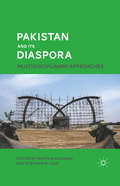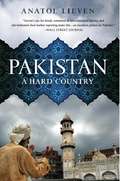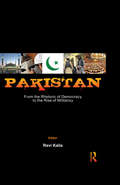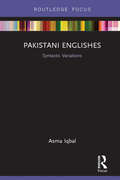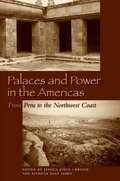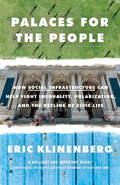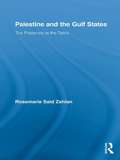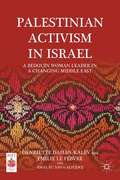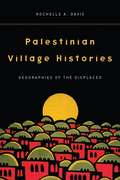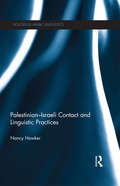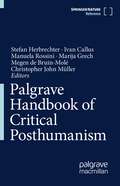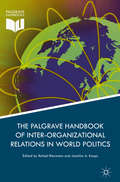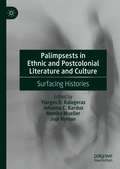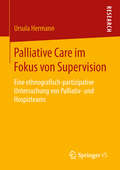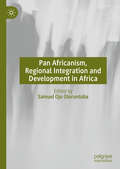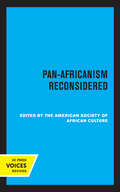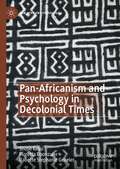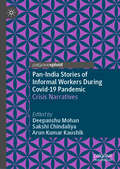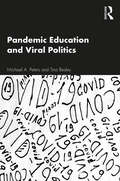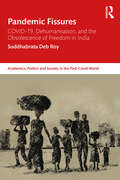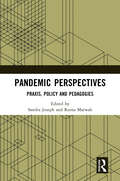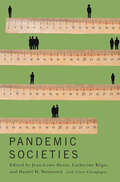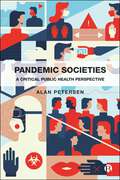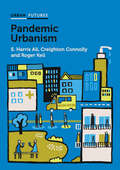- Table View
- List View
Pakistan and Its Diaspora
by Marta Bolognani Stephen M. LyonContributors offer an in-depth look at the dynamics of cultural and political change in Pakistan and the Pakistani Diaspora. Moving past static viewpoints, this volume demonstrates the multidirectional nature of the flow of ideas and people that create the social landscape experienced by Pakistanis globally.
Pakistan: A Hard Country
by Anatol Lieven?LievenOCOs eye for detail, command of subcontinental history, and old-fashioned shoe-leather reporting make this?an excellent primer on Pakistan. OCO?"Wall Street Journal"
Pakistan: From The Rhetoric Of Democracy To The Rise Of Militancy
by Ravi KaliaThe essays in this volume address the central theme of Pakistan’s enduring, yet elusive, quest for democracy. The book charts Pakistan’s struggle from its very inception, at least in the political rhetoric provided by both civilian and military leaders, for democracy, liberalism, freedom of expression, inclusiveness of minorities and even secularism. At the same time, it demonstrates how in practice, the country has continued to drift towards increasingly brittle authoritarianism, religious extremism and intolerance of minorities — both Muslim and non-Muslim. This chasm between animated political rhetoric and grim political reality has baffled the world as much as Pakistanis themselves. In this volume, scholars and practitioners of statecraft from around the world have sought to explain the dichotomy that exists between the rhetoric and the reality. Crucial areas such as Pakistan’s troubled status as a theocracy; its relationship with the US; the position of women and their quest for empowerment; the Mujahir Qaumi movement; the sharp class divide that has led to an elitist political culture; and finally, an erudite discussion of the popular topic — Jinnah’s vision of Pakistan — are the focus of this book. This volume will be of interest to scholars of history, political science, international relations, sociology, anthropology and urban planning, policy-makers and think-tanks, as well as the wider reading public curious about South Asia.
Pakistani Englishes: Syntactic Variations
by Asma IqbalThis book explores how non-native speakers, especially in postcolonial states, use English to communicate. Focusing on Pakistan, the monograph analyzes word categories, phrase and sentence structures used in the region and compares them to British English. It draws extensively from language used in the media and uses Lexical Functional Grammar (LFG) parsers to develop the phrase structures for qualitative analysis and a manual approach to quantify the frequency of various types of phrases. The volume also highlights the possible reasons for the differences and locates language use in context. The volume will be of great interest to researchers, scholars, and teachers interested in linguistics, especially sociolinguistics, postcolonial studies, critical theory, media studies and World Englishes.
Palaces and Power in the Americas: From Peru to the Northwest Coast
by Jessica Joyce Christie Patricia Joan SarroAncient American palaces still captivate those who stand before them. Even in their fallen and ruined condition, the palaces project such power that, according to the editors of this new collection, it must have been deliberately drawn into their formal designs, spatial layouts, and choice of locations. Such messages separated palaces from other elite architecture and reinforced the power and privilege of those residing in them. Indeed, as Christie and Sarro write, "the relation between political power and architecture is a pervasive and intriguing theme in the Americas. " Given the variety of cultures, time periods, and geographical locations examined within, the editors of this book have grouped the articles into four sections. The first looks at palaces in cultures where they have not previously been identified, including the Huaca of Moche Site, the Wari of Peru, and Chaco Canyon in the U. S. Southwest. The second section discusses palaces as "stage sets" that express power, such as those found among the Maya, among the Coast Salish of the Pacific Northwest, and at El Tajín on the Mexican Gulf Coast. The third part of the volume presents cases in which differences in elite residences imply differences in social status, with examples from Pasado de la Amada, the Valley of Oaxaca, Teotihuacan, and the Aztecs. The final section compares architectural strategies between cultures; the models here are Farfán, Peru, under both the Chimú and the Inka, and the separate states of the Maya and the Inka. Such scope, and the quality of the scholarship, make Palaces and Power in the Americas a must-have work on the subject.
Palaces for the People: How Social Infrastructure Can Help Fight Inequality, Polarization, and the Decline of Civic Life
by Eric KlinenbergAn eminent sociologist and bestselling author offers an inspiring blueprint for rebuilding our fractured society. We are living in a time of deep divisions. Americans are sorting themselves along racial, religious, and cultural lines, leading to a level of polarization that the country hasn’t seen since the Civil War. Pundits and politicians are calling for us to come together, to find common purpose. But how, exactly, can this be done? In Palaces for the People, Eric Klinenberg suggests a way forward. He believes that the future of democratic societies rests not simply on shared values but on shared spaces: the libraries, childcare centers, bookstores, churches, synagogues, and parks where crucial, sometimes life-saving connections, are formed. These are places where people gather and linger, making friends across group lines and strengthening the entire community. Klinenberg calls this the “social infrastructure”: When it is strong, neighborhoods flourish; when it is neglected, as it has been in recent years, families and individuals must fend for themselves. Klinenberg takes us around the globe—from a floating school in Bangladesh to an arts incubator in Chicago, from a soccer pitch in Queens to an evangelical church in Houston—to show how social infrastructure is helping to solve some of our most pressing challenges: isolation, crime, education, addiction, political polarization, and even climate change. Richly reported, elegantly written, and ultimately uplifting, Palaces for the People urges us to acknowledge the crucial role these spaces play in civic life. Our social infrastructure could be the key to bridging our seemingly unbridgeable divides—and safeguarding democracy.
Palestine and the Gulf States: The Presence at the Table (Middle East Studies: History, Politics & Law)
by Rosemarie Said ZahlanThis final book from Rosemarie Said Zahlan, renowned scholar of Middle East Politics and History, explores the relationships between Palestine and the Gulf since the 1930s. These relationships have ebbed and flowed, crisscrossed barriers and events, and taken on different forms. They have pervaded national, regional and international relationships, have been bilateral and multilateral in nature, and have appeared and disappeared unexpectedly from the public arena. Surprisingly, this network of links and relationships has remained largely unknown. Rosemarie Said Zahlan fills this critical gap and demonstrates how the regional Gulf politics and great power intervention in this part of the world will long continue to be impacted by the abiding non-resolution of the Palestinian problem.
Palestinian Activism in Israel
by Henriette Dahan-Kalev Emilie Le Febvre Amal El�sana-Alh�joojA close description of Amal El'Sana-Alh'jooj's experiences as a Palestinian Bedouin female activist, this book explores Amal's activism and demonstrates that activists' biographies provide a means of understanding the complexities of political situations they are involved in.
Palestinian Village Histories: Geographies of the Displaced
by Rochelle A. DavisThroughout modern-day Israel, over four hundred Palestinian villages were depopulated in the 1947-1949 war. With houses mostly destroyed, mosques and churches put to other uses, and cemeteries plowed under, Palestinian communities were left geographically dispossessed. Palestinians have since carried their village names, memories, and possessions with them into the diaspora, transforming their lost past into local histories in the form of "village memorial books". Numbering more than 100 volumes in print, these books recount family histories, cultural traditions, and the details of village life, revealing Palestinian history through the eyes of Palestinians. Through a close examination of these books and other commemorative activities,Palestinian Village Historiesreveals how history is written, recorded, and contested, as well as the roles that Palestinian conceptions of their past play in contemporary life. Moving beyond the grand narratives of 20th century political struggles, this book analyzes individual and collective historical accounts of everyday life in pre-1948 Palestinian villages as composed today from the perspectives of these long-term refugees.
Palestinian-Israeli Contact and Linguistic Practices (Routledge Arabic Linguistics Series)
by Nancy HawkerOffering insight into linguistic practices resulting from different kinds of Palestinian-Israeli contact, this book examines a specific conceptualisation of the link between the political and economic contexts and human practices, or between structure and agency, termed "articulation". The contexts of the military occupation, a shared consumer market, controlled cheap labour migration, and the provision of social services, supply the setting for power relations between Israelis and Palestinians which give rise to a variety of linguistic practices. Among these practices is the borrowing of Hebrew words and phrases for use in Palestinians’ Arabic speech. Hebrew borrowings can demarcate in-groups, signal aspirations to a modern lifestyle, and give a political edge to humour. Nancy Hawker’s explanation for these practices moves away from the notions of conflict and national identity and gives prominence to Palestinian and Israeli ideologies that inform the conceptual experience of Palestinians. Addressing an understudied linguistic situation, Palestinian-Israeli Contact and Linguistic Practices brings us documentation and analysis of recent casework, firmly anchored in empirical results from fieldwork in three refugee camps in the Occupied Palestinian Territories. Combining sociolinguistics with politics, economics, sociology and philosophy this book will be of great interest to students and scholars of Middle East Studies, Linguistics and Political Theory.
Palgrave Handbook of Critical Posthumanism
by Manuela Rossini Stefan Herbrechter Ivan Callus Marija Grech Megen de Bruin-Molé Christopher John MüllerPalgrave Handbook of Critical Posthumanism is a major reference work on the paradigm emerging from the challenges to humanism, humanity, and the human posed by the erosion of the traditional demarcations between the human and nonhuman. This handbook surveys and speculates on the ways in which the posthumanist paradigm emerged, transformed, and might further develop across the humanities. With its focus on the posthuman as a figure, on posthumanism as a social discourse, and on posthumanisation as an on-going historical and ontological process, the volume highlights the relationship between the humanities and sciences. The essays engage with posthumanism in connection with subfields like the environmental humanities, health humanities, animal studies, and disability studies. The book also traces the historical representations and understanding of posthumanism across time. Additionally, the contributions address genre and forms such as autobiography, games, art, film, museums, and topics such as climate change, speciesism, anthropocentrism, and biopolitics to name a few. This handbook considers posthumanism’s impact across disciplines and areas of study.
Palgrave Handbook of Inter-Organizational Relations in World Politics
by Joachim A. Koops Rafael BiermannThis unique handbook brings together a team of leading scholars and practitioners in order to map, synthesize and assess key perspectives on cooperation and rivalry between regional and global organizations in world politics. For the first time, a variety of inter-disciplinary theoretical and conceptual perspectives are combined in order to assess the nature, processes and outcomes of inter-organizational partnerships and rivalries across major policy areas, such as peace and security, human rights and democratisation as well as finance, development and climate change . This text provides scholars, students and policy-makers of International Relations with an exhaustive reference book for understanding the theoretical and empirical dimensions of an increasingly important topic in International Relations (IR), Global Governance and related disciplines.
Palimpsests in Ethnic and Postcolonial Literature and Culture: Surfacing Histories
by Jopi Nyman Monika Mueller Johanna C. Kardux Yiorgos D. KalogerasThis volume explores ways in which the literary trope of the palimpsest can be applied to ethnic and postcolonial literary and cultural studies. Based on contemporary theories of the palimpsest, the innovative chapters reveal hidden histories and uncover relationships across disciplines and seemingly unconnected texts. The contributors focus on diverse forms of the palimpsest: the incarceration of Native Americans in military forts and their response to the elimination of their cultures; mnemonic novels that rework the politics and poetics of the Black Atlantic; the urban palimpsests of Rio de Janeiro, Marseille, Johannesburg, and Los Angeles that reveal layers of humanity with disparities in origin, class, religion, and chronology; and the palimpsestic configurations of mythologies and religions that resist strict cultural distinctions and argue against cultural relativism.
Palliative Care im Fokus von Supervision: Eine Ethnografisch-partizipative Untersuchung Von Palliativ- Und Hospizteams
by Ursula HermannUrsula Hermann geht den Fragen nach, wie Hospiz- und Palliativteams ihre beruflichen Anforderungen erleben und welche Themen sie in der Supervision zur Sprache bringen. Dafür untersucht sie das Feld der Hospiz- und Palliativversorgung mithilfe des Beratungssettings Supervision. Die ethnografische Methode der teilnehmenden Beobachtung gewährt Einblicke in Beratungsprozesse, die partizipative Forschungsstrategie ermöglicht eine Teilhabe an den Forschungsergebnissen für Supervisandinnen und Supervisanden. Die Erfahrungen und Handlungspraktiken der Berufsgruppen machen deutlich, welche Themenvielfalt sich in der Betreuung und Versorgung von Sterbenden und schwer kranken Menschen zeigt und welche Herausforderungen eine organisationale Einbettung von Palliative Care mit sich bringt.
Pan Africanism, Regional Integration and Development in Africa
by Samuel Ojo OloruntobaThis edited volume addresses the accomplishments, prospects and challenges of regional integration processes on the African continent. Since regional integration is a process that ebbs and flows according to a wide range of variables such as changing political and economic conditions, implications and factors derived from the vagaries of migration and climate change, it is crucial to be cognizant with how these variables impact regional integration initiatives. The contributors discuss the debates on Pan-Africanism and linking it with ongoing discourses and policies on regional integration in Africa. Other aspects of the book contain some of the most important topic issues such as migration, border management and the sustainable development goals. This content offers readers fresh and innovative perspectives on various aspects of sustainable development and regional growth in Africa.
Pan-Africanism Reconsidered
by John A. DavisThis title is part of UC Press's Voices Revived program, which commemorates University of California Press’s mission to seek out and cultivate the brightest minds and give them voice, reach, and impact. Drawing on a backlist dating to 1893, Voices Revived makes high-quality, peer-reviewed scholarship accessible once again using print-on-demand technology. This title was originally published in 1962.
Pan-Africanism and Psychology in Decolonial Times (Pan-African Psychologies)
by Floretta Boonzaier Shose Kessi Babette Stephanie GekelerThis book explores the potential of Pan-African thought in contributing to advancing psychological research, theory and practice. Euro/American mainstream psychology has historically served the interests of a dominant western paradigm. Contemporary trends in psychological work have emerged as a direct result of the impact of violent histories of slavery, genocide and colonisation. Hence, this book proposes that psychology, particularly in its social forms, as a discipline centered on the relationship between mind and society, is well-placed to produce the critical knowledge and tools for imagining and promoting a just and equitable world.
Pan-India Stories of Informal Workers During Covid-19 Pandemic: Crisis Narratives
by Deepanshu Mohan Sakshi Chindaliya Arun Kumar KaushikThis book aims to delve into the application of feminist ethnography by engaging with the lived experiences of vulnerable workers, occupied by India’s informal workforce, across its deeply stratified labour-market landscape. Set up and organized in a diverse spatial trajectory through identified case studies from across India, the book, in a post pandemic context, aims to study, critically reflect on the vulnerable state of India’s workforce, capturing the daily emergencies, livelihood of marginalized communities. Case studies in the book feature the pandemic-crisis narratives of farmers, fisherfolk, factory workers, artisans, small scale entertainment providers, sanitation, and waste workers, to name a few.By understanding the intersectional dimensions of social structures like caste, gender, and class our case studies in the book also attempt to unpack the ‘dualities’ present in the contemporary understanding of India’s labour market. Reflective discussions with field ethnographers through first-person narratives help documenting their own observations from different case studies, while focusing on interactions on how to work through power dynamics and varied positionalities across dynamic field sites marked with different spatial characteristics. The text is primarily aimed at students and peer scholars of development studies, or for those who interested in learning about the application of ethnographic methods to studying/understanding the governing dynamics of informality across India and South Asia.
Pandemic Education and Viral Politics
by Michael A. Peters Tina BesleyViral modernity is a concept based upon the nature of viruses, the ancient and critical role they play in evolution and culture, and their basic application to understanding the role of information and forms of bioinformation in the social world. The concept draws a close association between viral biology on the one hand and information science on the other to understand ‘viral’ technologies, conspiracy theories and the nature of post-truth. The COVID-19 pandemic is a major occurrence and momentous tragedy in world history, with millions of infections and many deaths worldwide. It has disrupted society and caused massive unemployment and hardship in the global economy. Michael A. Peters and Tina Besley explore human resilience and the collective response to catastrophe, and the philosophy and literature of pandemics, including ‘love and social distancing in the time of COVID-19’. These essays, a collection from Educational Philosophy and Theory, also explore the politicization of COVID-19, the growth of conspiracy theories, its origins and the ways it became a ‘viral’ narrative in the future of world politics.
Pandemic Fissures: COVID-19, Dehumanisation, and the Obsolescence of Freedom in India (Academics, Politics and Society in the Post-Covid World)
by Suddhabrata Deb RoyThis book analyses India’s response to COVID-19, using an intersectional framework that highlights the roles of the central government, regional governments, and community organisations, both formal and informal. The volume brings forward the immense potential embedded within collective communitarian formations by exploring themes such as disaster capitalism, municipal socialism, civic capitalism, apocalypse or disaster communism, and Marxist humanism in relation to the management strategies exhibited by the Indian government towards the COVID-19 pandemic. It underscores the necessity for imagining a scenario where egalitarian and socially just policies replace the dominance of capitalism.Part of the Academics, Politics and Society in the Post-COVID World series, the book will be an essential read for scholars and researchers of sociology, political studies, cultural studies, social anthropology, South Asia studies, pandemic studies, and postcolonial studies.
Pandemic Pedagogies: Teaching and Learning during the COVID-19 Pandemic (The COVID-19 Pandemic Series)
by J. Michael RyanPandemic Pedagogies: Teaching and Learning during the COVID-19 Pandemic provides critical insights into the impact of the pandemic on the education system, pedagogical approaches, and educational inequalities. Education is often touted as the best way to promote social mobility and produce informed members of society. The pandemic has significantly threatened those goals by temporarily disrupting education and exacerbating disparities in the education system. The scholarship in this volume takes a closer look at many of the issues at the heart of the educational process including teacher self-efficacy, the gendered and racialized impacts of the pandemic on education, school closures, and institutional responses. Drawing on the expertise of scholars from around the world, the work presented here represents a remarkable diversity and quality of impassioned scholarship on the impact of COVID-19 and is a timely and critical advance in knowledge related to the pandemic.
Pandemic Perspectives: Praxis, Policy and Pedagogies
by Reena Marwah Sandra JosephThe book explores the impacts of the COVID-19 pandemic on nations across the globe since early 2020. It hosts a variety of perspectives within economic, social and development research studies, providing contemporary and proper information. The book also presents policy prescriptions for developing economies, critiques the system of disease surveillance and waste management, and defines a vision for India's development. It also mirrors issues related to digitisation, marginalisation, government regulations and health systems and provides original ideas for innovative methodologies suitable for higher education.Print edition not for sale in South Asia (India, Sri Lanka, Nepal, Bangladesh, Pakistan and Bhutan)
Pandemic Societies
by Jean-Louis Denis, Catherine Régis, and Daniel WeinstockAt the outset of the COVID-19 pandemic, many thought the changes taking place would be fleeting. It is now widely recognized that COVID-19 will not be the last pandemic in our highly interconnected world, and “pandemic societies” will be with us for some time.Pandemic Societies brings together experts in a wide range of academic disciplines to reflect on how their fields might be transformed in this new context. While the pandemic forces global institutions, such as the World Health Organization, to reimagine the ways in which they function, it also reaches into our everyday lives to change how we organize culture, performing arts, sports, tourism, and cities. Exploring how COVID-19 has altered people’s daily experiences – the ways they meet to play, to perform, and to entertain themselves – this book also pulls the lens back to take in the broader institutional and political contexts in which these quotidian activities are carried out.Examining the profound ways in which the COVID-19 pandemic has transformed every aspect of our lives, Pandemic Societies attempts to understand how we might act to steer this pandemic society, and how to reinvent institutions and practices that we think of as intrinsically face to face.
Pandemic Societies: A Critical Public Health Perspective
by Alan PetersenFrom SARS to Zika, and Ebola to COVID-19, epidemics and pandemics have become increasingly prevalent in recent years. Each outbreak presents new challenges but the responses are often similar. This important book explores the dimensions, dynamics and implications of emerging pandemic societies. Drawing on ideas from sociology and science and technology studies, it sheds new light on how pandemics are socially produced and, in turn, shape societies in areas such as governance, work and recreation, science and technology, education, and family life. It offers pointers to the future of pandemic societies, including the expansion of technologies of surveillance and control, as well as the prospects of social renewal created by economic and social disruption.
Pandemic Urbanism: Infectious Diseases on a Planet of Cities (Urban Futures Series)
by Roger Keil S. Harris Ali Creighton Connolly<p>Emerging infectious disease outbreaks have transformed the very nature of urban life worldwide, even as the extent and experience of pandemics are shaped by the planetary urban condition. Pandemic Urbanism critically investigates these relationships in a world faced with its first pandemic on a majority urban planet.<p> <p>The authors reveal the social and historical context of recent infectious disease events and how they have variously transformed the urban fabric. They highlight the important role played by socio-ecological processes associated with the global urban periphery – suburban or post-suburban zones and hinterland areas of “extended” urbanization – changing mobility patterns, and new forms of urban governance and pandemic response. The book develops novel insights for post-pandemic urban governance and planning grounded in the quest for social and spatial justice. In doing so, it reveals a paradox at the heart of pandemic urbanism: urban life enables contagion to spread easily, yet at the same time offers unique possibilities to contain and respond to disease outbreaks.<p>
